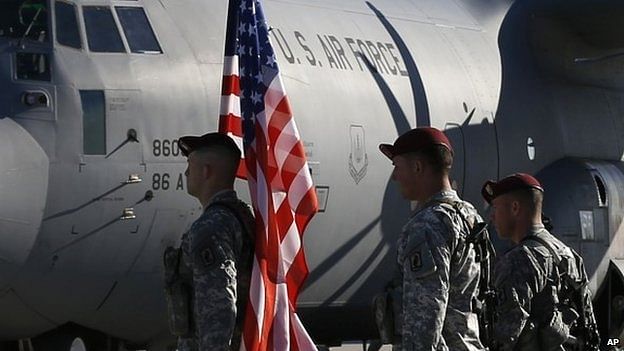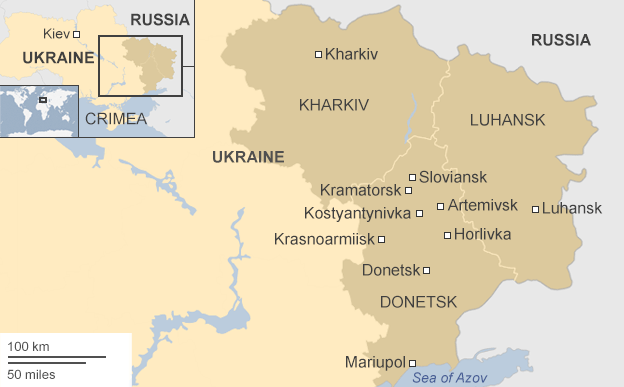Russia alarmed over US-Nato military moves
Russia alarmed over US-Nato military moves

Moscow has voiced concern over an "unprecedented" increase in US and Nato military activity near Russian borders, amid an escalating crisis in Ukraine.
Russia's Defence Minister Sergei Shoigu told US counterpart Chuck Hagel in a phone call to "tone down the rhetoric".
But the US said Shoigu also pledged Russia would not invade Ukraine.
Pro-Russia activists have seized buildings in more than a dozen towns in the east and still hold seven European military observers in Sloviansk.
On Monday the US announced new sanctions on Russia over Moscow's actions in Ukraine.

The sanctions target seven Russian individuals and 17 companies which Washington says are linked to President Vladimir Putin's "inner circle".
The European Union on Tuesday also named another 15 people to be placed under "restrictive measures".
The list includes Gen Valery Gerasimov, chief of the Russian General Staff, and Lt Gen Igor Sergun, identified as the head of the Russian military intelligence agency, the GRU.
'Provocative'
In a statement, Shoigu said he had a "candid" hour-long phone call with his American counterpart.
Shoigu stressed that US and Nato military activity in eastern Europe was accompanied by "provocative" statements about the need to "contain" Russia.
The US has sent 600 troops to Poland and the Baltic states. Washington says it has deployed the extra troops to reassure Nato allies.
Shoigu announced that Russian troops had returned to their "permanent positions" after conducting military exercises on the border with Ukraine.
But he did not say whether the overall number of Russian troops deployed in the region - said to be around 40,000 - had been reduced.
The Pentagon said Shoigu had given "assurances that Moscow has no plans to invade Ukraine".
It said Hagel had warned that Russia's continued aggression would result in more diplomatic and economic pressure.
He also called on Moscow to help secure the release of the seven military observers linked to the Organization for Security and Co-operation in Europe who were seized by pro-Russian gunmen in Sloviansk last week.
Some 40 people, including journalists, pro-Kiev activists and three members of Ukraine's security service are being held there.
The Russian ambassador to the OSCE, Andrei Kelin, earlier said Moscow was taking "steps" to secure the observers' release.
Journalist's ordeal
The US and EU first imposed visa bans and asset freezes on a number of senior Russian officials and companies after Moscow annexed Crimea from Ukraine last month.
On Monday, Washington added to its sanctions list "in response to Russia's continued illegal intervention in Ukraine and provocative acts that undermine Ukraine's democracy".
Russian Deputy Foreign Minister Sergei Ryabkov said Moscow's response would be "painful for Washington".
Among the individuals named are Igor Sechin, head of state oil giant Rosneft, and Alexei Pushkov, chairman of the committee of international affairs of Russia's lower house of parliament.
Gas producer Gazprom, whose chief executive was spared sanctions, warned in a statement on Tuesday that further measures could damage its business and the BBC's Daniel Sandford in Moscow says there is a sense of nervousness in Russia that sanctions may start to bite.
The US accused Russia of "doing nothing to meet the commitments it made" at a meeting with Ukraine, the US and EU in Geneva on 17 April, which it said had included refraining from violence or provocative acts.
Meanwhile, a US journalist who was kidnapped and held hostage for several days last week by pro-Russian activists has been speaking to the BBC.
Simon Ostrovsky said he was pulled out of his car at a checkpoint in Sloviansk.
"I was separated from my other colleagues and taken down into the basement, blindfolded. I had my hands tied behind my back. I was thrown on the floor and beaten up and held there for the next three days," he said.
But he said he was unable to confirm any of those involved were from Russia.